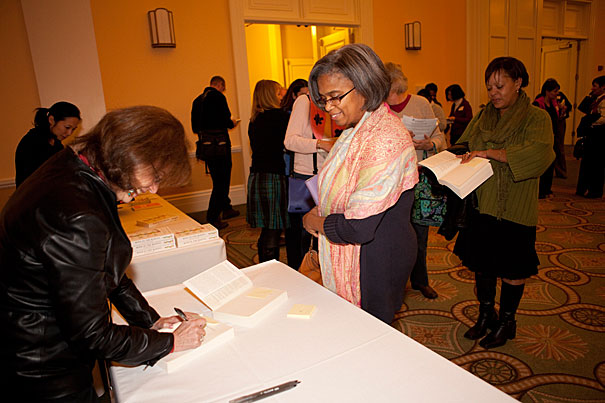
Ellen Galinsky (left) signs her book for Cynthia Jacobs-Tolbert, assistant principal of John Marshall Elementary School in Dorchester.
Photo by Julie Moscatel/HPAC
Learning better
Author visits Harvard to talk with educators, parents about ways to help children excel
Ellen Galinsky, president and co-founder of New York City’s Families and Work Institute (FWI), has spent decades analyzing more than 1,000 research studies and interviewing leaders in neuroscience and child development, including Harvard’s Jack Shonkoff, Charles Nelson, and Heidelise Als. The result of that career-long effort is “Mind in the Making,” Galinsky’s guide for teachers and parents who want clear-cut strategies for helping their kids succeed in school and life.
On Dec. 2, Galinsky talked with nearly 60 teachers, principals, child-care providers, and parents at Harvard Business School’s Spangler Center about the “seven essential life skills every child needs.” She also shared video shorts of primary research conducted at universities throughout North America and discussed strategies for promoting the skills that naturally emerge in all children.
The presentation was a result of Harvard’s relationship with Galinsky and FWI, which began in 2007, when the Harvard Achievement Support Initiative (HASI), United Way of Massachusetts Bay and Merrimack Valley, and Connected Beginnings Training Institute joined forces to bring the Mind in the Making training program to the state. The 12-part, 30-hour training program was built on the foundational research of the book, but is delivered through an intense hands-on and reflective experience. Since 2007, the partnership among HASI, United Way, and Connected Beginnings has trained more than 700 educators and providers throughout Massachusetts. As part of the work, HASI led the first public school pilot of Mind in the Making in the nation, and currently is training teachers, paraprofessionals, and principals in three Boston public schools — Marshall Elementary School, Russell Elementary School, and E. Greenwood Leadership Academy.
In one video, the work of Stanford’s Carol Dweck shows middle school-aged children working on simple puzzles. During the experiment, some children are praised for their effort and strategy in completing the puzzle, while others are praised for their intelligence. When the children are faced with the choice to complete another simple puzzle or take on a more challenging one, those praised for their effort choose the challenge, while the children who were told how smart they are select the simpler one.
During the Q&A a teacher from the audience asked Galinsky what to do when older children won’t take on new challenges.
“Help the student articulate a goal,” Galinsky said, “then support the work and effort toward that goal, rather than the final product. This will help move the student to a growth mindset and away from completing tasks only he or she feels confident to complete successfully.”
After the presentation, Teresa Harvey-Jackson, principal of the Marshall Elementary School in Dorchester, praised Galinsky for her work, but said the public school system needs to see the research applied in a more hands-on way. “We feel very fortunate to have the comprehensive training brought to us by Harvard, because as great as I’m sure this is, we need more support than just a book.”
Galinsky shared plans for a “Mind in the Making” activity guide and companion DVD that she hopes will be released this summer, as well as updates to the more intensive training in which Harvey-Jackson is participating.
“The good news for all of us,” Galinsky ended, “is that any child can learn and any adult can promote a love of learning without fancy tools or toys. And although supporting kids earlier is better, it’s never too late.”




